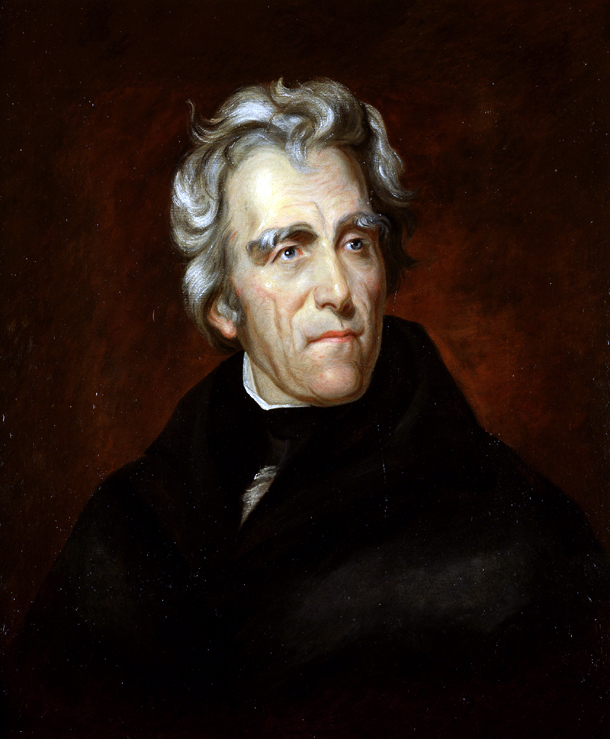Less than five years before the start of our Civil War, for example, Senator Charles Sumner, an antislavery Republican from Massachusetts, was nearly clubbed to death by South Carolina Representative Preston Brooks after Sumner insulted Brooks’s relative, South Carolina Senator Andrew Butler, in a particularly inflammatory speech. And our first Secretary of the Treasury, Alexander Hamilton, was famously killed in an 1804 duel with former Vice President Aaron Burr, eventually giving rise to the first and funniest "Got Milk?" commercial.
Though his reasons were usually more personal than political, our seventh President, Andrew Jackson, allegedly fought more than a hundred duels. Jackson’s wife, Rachel, began living with him before her divorce from her first husband was official, and Jackson was always quick to respond to slurs (real or perceived) against her honor. In one of his most famous duels, fought in 1806, Jackson challenged attorney Charles Dickinson. Dickinson had insulted Rachel on a previous occasion, though the immediate provocation for the duel with Jackson was a letter to the newspaper in which Dickinson called him “a poltroon and a coward” following a dispute over a horse race. Dickinson, who had already met and killed 26 opponents, was a crack shot and he knew it, even stopping on the long ride to the agreed-upon Kentucky dueling grounds to show off his marksmanship to the friends accompanying him. Jackson realized he couldn’t match Dickinson’s skill with a pistol, but he had no lack of courage, so he settled on a strategy of allowing Dickinson a quick first shot, hoping it wouldn’t be fatal, after which Jackson intended to take slow and careful aim.
When Dickinson fired, smoke snaked its way out of Jackson’s coat, and Jackson touched a hand to his chest—but he didn’t waver. Baffled, Dickinson cried out, “My God, have I missed him?” Dickinson’s shot had in fact hit Jackson, breaking his ribs and narrowly missing his heart, but Jackson stood his ground. Then Dickinson had to remain still while Jackson fired. Jackson aimed, drew back the hammer of his pistol, squeezed the trigger—and the pistol stuck in the half-cocked position. The rules of the duel required Dickinson to wait while Jackson coolly drew back the hammer and aimed again. Jackson's shot hit Dickinson, who soon bled to death. When a doctor marveled that Jackson was able to remain on his feet despite his chest wound, Jackson replied, “I should have hit him if he had shot me through the brain.”
Fortunately, not all of history's famed political disputes feature bloodshed. In 1829 the Tory Duke of Wellington, then Britain's Prime Minister, spoke in favor of Catholic emancipation, whereupon the super-ultra-Tory tenth Earl of Winchilsea accused him of carrying on “insidious designs for the infringement of our liberties, and the introduction of popery into every department of the state.” Wellington challenged Winchilsea to a duel, and the earl had little choice but to accept the challenge. Despite his strong anti-Catholic feelings, Winchilsea nevertheless quickly came to the realization that it would be a faux pas of epic proportions to kill the hero of Waterloo. The two men met at Battersea Fields (now Battersea Park) on March 21, 1829, and when the signal to fire was given, the earl didn’t even raise his pistol. Wellington responded by purposely firing wide, whereupon Winchilsea fired into the air. Honor satisfied, Winchelsea ate crow, sending to the newspaper a letter he had already prepared in which he announced, “Having given the Duke of Wellington the usual satisfaction, I do not now hesitate to declare, of my own accord, that, in apology, I regret having unadvisedly published an opinion which the noble Duke states to have charged him with disgraceful and criminal motives in a certain transaction.” The Catholics and their supporters had the last laugh when the Roman Catholic Relief Act of 1829 became law less than a month later.
Let’s hope all this year’s political disputes end as civilly.
 Alyssa Everett's debut regency romance, Ruined by Rumor, is currently available from Carina Press, and her second regency will be out in March of 2013. She hopes you'll visit her website and follow her on Twitter and Facebook, where she promises not to spam you relentlessly.
Alyssa Everett's debut regency romance, Ruined by Rumor, is currently available from Carina Press, and her second regency will be out in March of 2013. She hopes you'll visit her website and follow her on Twitter and Facebook, where she promises not to spam you relentlessly.



2 comments:
Love the "I should have hit him if he had shot me through the brain" line even though in general I'm far from being an Andrew Jackson admirer--my husband's family is Oklahoma Cherokee, so I tend to view Jackson through the lens of the Trail of Tears.
I also love that portrait of Wellington. Easy on the eyes, indeed. ;-)
Perhaps that's the best way to settle the American upcoming election. Give the two candidates pistols at dawn and get it all over with.
Great post!
Post a Comment